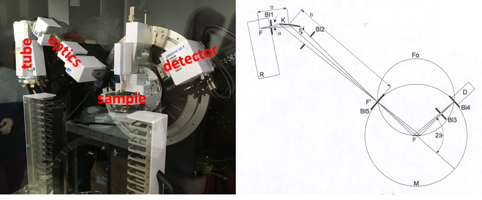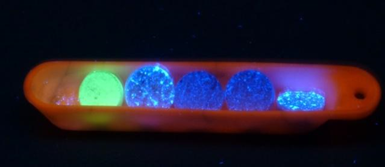ECTS
120 credits
Duration
2 years
Training structure
Faculty of Science
Language(s) of instruction
French
Presentation
Theoretical chemistry and molecular modeling play an increasingly important role in chemistry, biochemistry, physics, and materials science. This discipline of chemistry provides conceptual tools, qualitative models, and quantitative data that enable theoretical chemists to contribute to the development of innovative, tailor-made chemical systems.
100 %
Success rate
Objectives
The aim of the Theoretical Chemistry and Modeling program is to provide students with rigorous training in theoretical and computational chemistry with a view to entering academia or joining the R&D teams of major industrial groups. It offers dual expertise in computer science and theoretical chemistry through the teaching of a programming language and formal algebra tools.
Know-how and skills
Disciplinary skills:
- Define and implement a digital modeling strategy based on an experimental problem in chemistry, or at the intersection of physics and biochemistry (M)
- Exploit and analyze results from calculations based on the main methods of theoretical chemistry (E)
- Develop modeling and simulation tools, particularly for chemistry, through mastery of computer tools, various numerical methods, and at least one programming language (M)
Cross-functional skills:
- Participate in work meetings in English
- Design, lead, and manage a project independently
- Integrating into a professional environment
Organization
Internships, supervised projects
Internship | Mandatory |
|---|
Supervised projects in M1 and M2
- 1 mandatory internship in M1, minimum 2 months
- 1 mandatory internship in M2, minimum 5 months
Program
This program offers courses that are partly shared within the French Network for Theoretical Chemistry (RFCT) with lecturers from various universities in the South-West Cluster (Bordeaux, Montpellier, Pau, and Toulouse).
Select a program
M1 - Theoretical Chemistry and Modeling
Statistical Mechanics (University of Toulouse 3)
4 creditsQuantum Mechanics I
4 creditsLiquid NMR spectroscopy and X-ray diffraction
2 creditsOPTION 1
2 creditsChoose one of two options:
Advanced inorganic materials
2 creditsThermodynamics and phase equilibria
2 credits
Chemometrics, statistical data analysis, experimental design
2 creditsOrganometallic chemistry and heteroelement chemistry
2 creditsMethodology for characterizing materials
2 creditsOPTION 2
2 creditsChoose 1 from 1
Crystallography I
2 credits
Coordination chemistry and organic chemistry
2 creditsProfessional projects – project monitoring
8 credits
Molecular Modeling (University of Toulouse 3)
2 creditsInternship 2-4 months
10 creditsQuantum Mechanics II
5 creditsMaterials with remarkable electronic properties
4 creditsTheoretical Spectroscopy
3 creditsCommunication and professional integration
2 creditsElectronic and optical properties
2 creditsCoordination chemistry of f-elements
2 credits
M2 - Theoretical Chemistry and Modeling
Project management - Business law
4 creditsTheoretical organometallic reactivity
3 creditsModeling and Responsiveness
6 creditsMethodology of Quantum Chemistry
3 creditsModeling of materials with specific properties
4 creditsNumerical methods for theoretical chemistry
4 creditsAdvanced English
2 creditsAtomistic simulations
4 credits
5-6 month internship
30 credits
Admission
Admission requirements
Applications can be submitted on the following platforms:
- French and European students: follow the "Mon Master" procedure on the website:https://www.monmaster.gouv.fr/
- For M2 students, applicants must submit their application via the e-candidat application on the website of the Faculty of Sciences at the University of Montpellier:
- International students from outside the EU: follow the "Études en France" procedure:https://pastel.diplomatie.gouv.fr/etudesenfrance/dyn/public/authentification/login.html
Target audience
Recruitment level(s): Bachelor's degree + 3 years of higher education
Required education: Bachelor's degrees in Chemistry-Physics, Chemistry, or Physical Sciences are recommended for admission to Master's 1.
For direct entry into Master 2:
Ideally: Master's degree in Chemistry or Physical and Chemical Sciences, first year, with a strong focus on theoretical chemistry and modeling.
Carefully reviewed applications: less relevant training, but supplemented by modeling skills (through initial training or an internship) and accompanied by strong motivation.
Capacity
5 in M1 and M2
Mandatory prerequisites
The Theoretical Chemistry and Modeling program is primarily intended for students with a bachelor's degree in general chemistry or physical chemistry. Students with a bachelor's degree in general science may apply by submitting an application.
Recommended prerequisites
Hold a bachelor's degree with a major in physical chemistry or chemistry.
And after
Continuing education
Doctorate, most often in the field of modeling in chemistry (quantum chemistry, molecular or solid modeling and dynamics, theoretical physical chemistry, etc.). Numerous opportunities to pursue a doctorate are available in France as well as abroad.
Continuing studies abroad
Doctorate, most often in the field of modeling in chemistry (quantum chemistry, molecular or solid modeling and dynamics, theoretical physical chemistry, etc.).
Professional integration
Graduates find employment in the field of modeling and simulation (design engineer, research and development engineer, chemical engineer in molecular modeling, etc.).
Other careers available to graduates of this program: Programmer Analyst, Software Developer.




